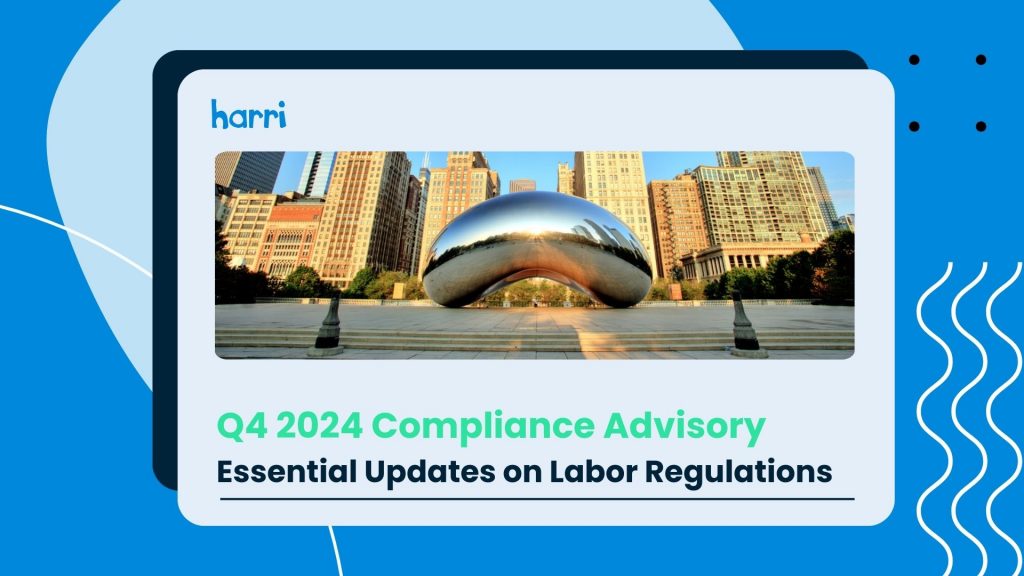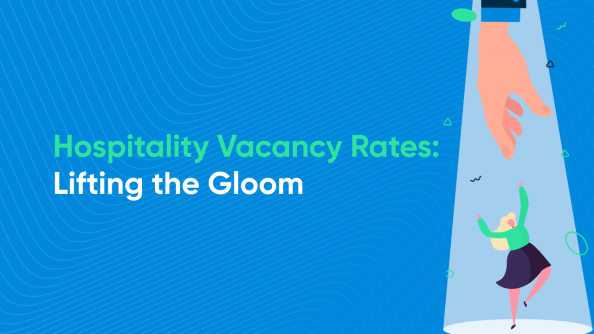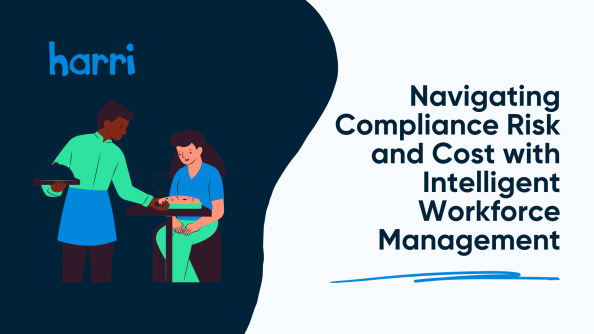Essential Updates on Labor Regulations: Q4 2024 Compliance Advisory

- By Harri Insider Team | December 18, 2024
Disclaimer: Please note this advisory is intended for summary purposes only. Any guidance or materials provided do not constitute legal advice and cannot be substituted for the advice of legal counsel.
Texas Federal Court strikes down Department of Labor’s Overtime Rule
On November 15, 2024, a federal district court in Texas struck down the U.S. Department of Labor’s (DOL) final overtime rule, stating the DOL lacked the authority to implement the rule. The rule would have increased the minimum salary threshold for exempt employees under the Fair Labor Standards Act (FLSA) from $35,568 per year to $43,888 per year as of January 1, 2025. The rule also proposed to increase the threshold again to $58,656 per year, effective January 1, 2025. Given the abrogation of the rule, the FLSA overtime salary threshold will remain $35,568.
Euless Texas repeals Overtime and Scheduling Standards Ordinance
On September 24, 2024, the City of Euless repealed the Euless Overtime and Scheduling Standards Ordinance. Covered employers are no longer required to pay employees predictability pay for schedule changes within the Advance Notice period, nor are they required to comply with the schedule posting requirements. As a result, Harri will be removing Euless from its Fair Workweek Rule engine effective January 5th.
New Illinois Minor Labor Law effective Jan 1
In July of 2024, Governor JB Pritzker signed into law the Child Labor Law of 2024. This law establishes new requirements for minor employees fifteen (15) years and younger, such as limiting the number of hours they may work and further defining restricted types of work. The law also updates the school certification process, increases non-compliance penalty amounts, and requires employers to report any injuries a minor has incurred while on the job to the minor’s school.
Androckitis v. Virginia Mason Medical Center (Washington Break Law)
In Androckitis v. Virginia Mason Medical Center, Rheannon Androckitis and other employees filed a class action lawsuit against Virginia Mason, alleging that the medical center failed to compensate them for missed meal and rest breaks appropriately. Under Washington State’s Industry Welfare Act (IWA), employers must provide a 30-minute meal break during shifts exceeding five hours and a 10-minute rest break every four hours worked. The plaintiffs argued that the timekeeping system automatically assumed they took a meal break and deducted break time, even if they hadn’t taken it. When they did not take such breaks, Virginia Mason’s systems required employees to manually report that they did not take the break to reverse the deduction.
The court ruled in favor of the plaintiffs, finding that Virginia Mason’s policies fell short of meeting employee rights under Washington law. The court’s ruling is significant as it clarifies that paying employees solely for the time worked, without additional compensation for missed meal periods, violates Washington law. It required Virginia Mason to compensate employees with an extra 30 minutes of pay for each missed meal break, reinforcing that lost break time holds distinct value beyond standard wages. The ruling also asserted that Washington’s IWA is distinct from the Washington Minimum Wage Act and broadly addresses employee welfare, including break time, as essential to workers’ health.
Harri is working diligently to determine the next steps concerning this court ruling, and we remain committed to keeping our clients updated on any changes.
Proposed Expansion of Los Angeles Fair Workweek Ordinance to Fast Food Industry
On July 2, 2024, Los Angeles City Councilman Hugo Soto-Martinez proposed extending the Fair Workweek Ordinance to fast food workers employed by large chains with 50 or more locations nationwide. This proposal includes significant compliance requirements impacting scheduling, workforce management, and labor law adherence for affected employers. Employers would need to provide a predictable work schedule, ensuring advance notice and minimizing last-minute changes. Paid time off provisions would require employers to allow employees to accrue and use leave in accordance with the ordinance. Additionally, employers would have to fund annual, in-person training for workers on their rights. This training would need to be delivered by City-approved organizations and conducted during paid working hours. The proposal also includes enhanced enforcement mechanisms, requiring agencies to report on necessary oversight and compliance resources.
2024 Minimum Wage Ballot Measures
Two states voted to pass minimum wage measures during the November 2024 election cycle. Alaska voters passed Ballot Measure 1, increasing the state minimum wage to $15 per hour by July 1, 2027. Missouri voters passed Proposition A, increasing the state minimum wage to $15 per hour by 2026. On December 6, 2024, the Missouri Chamber of Commerce and Industry and other Missouri business groups filed a lawsuit in the Missouri Supreme Court requesting to invalidate Proposition A. Until a decision is made, employers should continue preparing for an increase on January 1, 2025.
Employers in Alaska should prepare for an initial minimum wage increase to $11.91 per hour on January 1, 2025. Once election results are certified, a second increase will raise the minimum wage to $13.00 on July 1, 2025 (see the Alaska Department of Labor and Workforce Development Labor Standards and Safety Division 2025 Minimum Wage Press Release).
Salary Transparency:
In 2024, several U.S. states enacted salary transparency laws. Below is a summary of these legislative developments:
Illinois
- Legislation: HB 3129; Amending the Illinois Equal Pay Act
- Effective Date: January 1, 2025
- Requirements: Employers with 15 or more employees must include pay scales and benefits in all job postings. Employers must maintain records of pay scales, benefits, and job postings for each position for at least five years. The Illinois Department of Labor will enforce these requirements and impose penalties for violations.
Maryland
- Legislation: SB 525/HB 649
- Effective October 1, 2024
- Requirements: Employers must disclose the wage range (minimum and maximum hourly or salary wage) and a general description of benefits and other compensation in all public and internal postings for jobs, promotions, transfers, or similar opportunities. If employers do not make a posting, they must provide this information before discussing compensation with applicants or upon their request. Employers must maintain records of postings, including compliance with wage range disclosure requirements, for at least three years after filling the position, or the posting is no longer active if the position remains unfilled. The Maryland Department of Labor has provided FAQs to assist with compliance.
Massachusetts
- Legislation: H.4890
- Effective date: July 31, 2025.
- Requirements: Employers with 25 or more employees in the state must include the pay range (annual salary range or hourly wage range) in all job postings and internal postings for promotions or transfer to positions with different responsibilities. Employers must provide the pay range to current employees and applicants upon request. Employers must maintain records related to pay transparency for all job postings and internal opportunities.
Minnesota
- Legislation: Omnibus Labor and Spending Bill
- Effective Date: January 1, 2025
- Requirements: Employers with 30 or more employees across one or more sites in Minnesota must include the minimum and maximum annual salary or hourly range, or a fixed pay rate, in job postings. Postings must also include a general description of all benefits and other compensation.
New Jersey
- Legislation: SB2310
- Effective Date: June 1, 2025
- Requirements: Employers with ten or more employees must disclose the hourly or salary range and provide a general description of benefits and other compensation programs available for the position in all internal and external job postings.
Vermont
- Legislation: H. 704
- Effective date: July 1, 2025
- Requirements: Employers with five or more employees must include compensation details in job advertisements for positions in Vermont or remote positions supporting Vermont-based offices. Advertisements must disclose the compensation or a range of compensation for the position. For tipped positions, employers must disclose the base wage or range of base wages, excluding tips. By January 1, 2025, the Attorney General’s Office will publish guidance for employers and employees regarding the new law on its website.
Maryland Pay Stub and Pay Statement Law
Effective October 1, 2024, Maryland’s Senate Bill 38 (Chapter 305) introduced changes to the state’s wage payment and collection laws. Employers are now required to provide written notice at the time of hiring, including the employee’s pay rate(s), regular paydays, and details of leave benefits. Employers must also provide advance notice of at least one pay period of payday changes or wages. The Commissioner of Labor and Industry created a free Pay Stub Template for employers. Additional information is available in the Instructions released by the Maryland Department of Labor.
New Notice Requirements for Massachusetts Employers
Employers with more than 50 full-time employees must provide clear and accessible information about veterans’ benefits and services in a prominent location in the workplace that is easily accessible to employees. Additionally, the notice must be distributed to all employees at the start of their employment and on an annual basis. The required notice is not yet available, but employers should continue to monitor the Massachusetts Executive Office of Veterans Services and Executive Office of Labor and Workforce Development websites for its release.
Harri, your partner in compliance
As employment regulations continue to evolve, Harri stands by your side, ready to assist in managing these changes. Recognized for our expertise in employer technology solutions, we focus on equipping you with the necessary tools and insights to support your compliance efforts. Choose Harri as your partner in compliance.




















